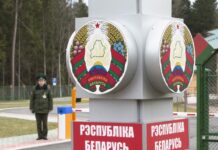
Last month, Lithuania imposed restrictions on sanctioned goods transiting its territory to Kaliningrad. In the Russian exclave on the Baltic coast, ethnic Lithuanians began to feel threatened.
Sigitas Šaborskis, chairman of the Kaliningrad Lithuanian Community, currently lives in Lithuania and says he is worried about Lithuanians who still live in the Russian exclave. He is most concerned about the young Russian citizens of Lithuanian origin who are being sent to the war in Ukraine. “Lithuania should help these grandchildren and great-grandchildren of our political prisoners and exiles [avoid] being forced to kill or perish.”
Moreover, Lithuanians in Kaliningrad receive many threats because of their homeland’s policies vis-à-vis Russia, according to Šaborskis. He left Kaliningrad a couple of years ago and advises his compatriots to do the same. But leaving is not easy. Since Moscow’s invasion of Ukraine, Lithuania no longer issues visas to Russian citizens, with just a few exceptions.
Every week, the Foreign Ministry receives several dozen enquiries from Russian citizens of Lithuanian on citizenship, residence permits, or asylum. But Lithuanian politicians are wary of opening their borders to them, saying that their loyalty and views are unclear, and may pose a threat to the country, according to Dalia Asanavičiūtė, chairwoman of the Seimas and Lithuanian World Community Commission. According to the Foreign Ministry, six applications to acquire Lithuanian citizenship have been received in Kaliningrad since the Russian invasion of Ukraine.Šaborskis says Moscow is also restricting the departure of young people: “This could be understood as a preparation for a general mobilisation.”

Another source of concern is the tension over Kaliningrad transit. In June, Lithuania began blocking the transit of sanctioned goods via its territory. This sparked a standoff with Moscow before the European Commission instructed Vilnius to allow rail transit to continue uninterrupted. Russian authorities have begun closing down Lithuanian cultural institutions in the exclave.
The children’s folklore ensemble Malūnėlis, which has been active in Kaliningrad for 10 years, will no longer be able to perform after it was banned from representing the Kaliningrad region at the Russian Folk Festival. “They were banned […] because they were Lithuanians – the national hatred manifested itself in such a way,” said Šamborskis. He thinks it is very likely that another dozen Lithuanian collectives will meet a similar fate. The Lithuanian Language Teachers’ Association, which included 11 teachers responsible for improving the Lithuanian language skills of some 650 people in Kaliningrad, was also closed down.
“The Lithuanian Language Association has been de-registered by a court decision, and everything that has been created over 30 years is being destroyed at the behest of special services,” Šamborskis said. The association had been active since 1995.
Lithuanian-language activities have been blocked in every possible way for many years, according to Virginija Rinkevičienė, a representative of the Lithuanian Ministry of Education, Science and Sports. “During these few years, a number of schools have been closed down. In Kaliningrad, schools that used to have Lithuanian language faculties have simply refused to continue providing the service.” In spring, there were 13 Lithuanian schools in Kaliningrad that were funded through the Lithuanian Language Teachers’ Association.
In Sovetsk last month, a plaque dedicated to Vilhelmas Storosta-Vydūnas, a writer and philosopher who lived and worked there, was taken down. A bas-relief of Martynas Mažvydas was also covered by a plastic sheet in Neman, although the sheet was later removed.
“Until the regime changes, it is impossible to talk about dialogue. Even the posts of culture attaché and heritage attaché are vacant because Russia is not letting them in,” said Culture Minister Simonas Kairys.





























